- Share full article
Advertisement
Supported by

Germany’s Leader Walks a Fine Line in China
Chancellor Olaf Scholz tried to promote German business interests while delivering warnings from Europe about trade and geopolitical tensions.

By Alexandra Stevenson and Melissa Eddy
Chancellor Olaf Scholz of Germany tried to strike a delicate balance on a trip to China this week, promoting business ties with his country’s biggest trading partner while raising concerns over its surge of exports to Europe and its support for Russia.
Mr. Scholz met with China’s top leader, Xi Jinping, at the Diaoyutai State Guesthouse in Beijing on Tuesday, the culmination of a three-day visit with a delegation of German officials and business leaders. He also met with Premier Li Qiang as the two countries navigate relations strained by Russia’s war in Ukraine and China’s rivalry with the United States, Germany’s most important ally.
Throughout his trip, Mr. Scholz promoted the interests of German companies that are finding it increasingly hard to compete in China. And he conveyed growing concern in the European Union that the region’s market is becoming a dumping ground for Chinese goods produced at a loss .
But Mr. Scholz chose a conciliatory tone over a combative one in his opening remarks before sitting down with Mr. Xi on Tuesday morning, in a meeting that stretched over three hours and turned into a walk and lunch.
It was the German leader’s first visit to China since his government adopted a strategy last year that defined the Asian power as a “partner, competitor and systemic rival ,” calling on Germany to reduce its dependency on Chinese goods.
Germany’s economy shrank last year, and its weaknesses have exposed a reliance on China for growth. Energy prices have risen because of the war in Ukraine, which has been facilitated by Beijing’s support for the Kremlin. German companies have pushed for more access to China and complained that they face unfair competition .
The chancellor visited German companies with extensive investments in China and met with trade representatives and officials in the sprawling industrial metropolis of Chongqing in China’s southwest and in Shanghai and Beijing.
At a talk with a group of students in Shanghai on Monday, Mr. Scholz fielded a question from a student who planned to study in Germany this year, who said he was “really worried” because the country had partially legalized cannabis. “When you study in Berlin, you can run around the whole time and never meet anyone who does that,” the chancellor assured him.
But he also used the platform to push more serious messages about trade. “Competition must be fair,” Mr. Scholz told the students. “We want a level playing field,” he said.
Mr. Scholz’s trip was an example of the difficult dance that Germany is trying to do: maintaining economic ties with China while managing U.S. pressure to align itself more closely with Washington against Beijing.
In his meetings, Mr. Scholz highlighted Germany’s commitment to doing business with China, but he also warned that Beijing had to curb the flood of Chinese goods into Europe. At the same time, he expressed reservations about the European Union’s investigations into China’s use of subsidies for green technology industries, saying that any discussion about trade must be based on fairness.
“This must be done from a position of self-confident competitiveness and not from protectionist motives,” Mr. Scholz told reporters on Monday.
China’s manufacturing push in green sectors like electric cars and solar panels has touched off trade disputes with Europe and the United States, where such industries have also received government support. But with 5,000 German companies active in the Chinese market, Germany stands to lose more than many of its European partners would if Beijing were to retaliate against the European Union.
“If the E.U. goes too hard against China, we could expect countermeasures and this would be a catastrophe for us,” said Maximilian Butek, the executive director of the German Chamber of Commerce in China.
“For us it’s extremely important that the Chinese market remains open,” he said.
In his meeting with Mr. Xi, Mr. Scholz indicated that Russia’s war on Ukraine and its arms buildup were high on his agenda. “They directly affect our core interests. Indirectly, they damage the entire international order,” he said in opening remarks at the meeting, a transcript of which was provided by Mr. Scholz’s office.
Despite pressing the issue with Mr. Xi, he did not appear to win the commitment that he had sought from the Chinese leader to take part in an international conference for Ukraine planned in June. Germany had hoped that China could use its influence over Russia to help work toward a peace agreement.
Germany would also like China stop selling goods to Russia that have potential uses on the battlefield, and Mr. Scholz told reporters that he had brought up the issue in his meeting. “The point has been made,” he said. “There can be no misunderstanding about how we see things.”
China is hoping to drive a wedge between Europe and the United States by courting leaders such as Mr. Scholz. State media reports depicted his visit as demonstrating the strength of China’s relations with Europe, playing up its economic ties with Germany.
In his opening remarks to Mr. Scholz, Mr. Xi said cooperation between China and Germany, which have the second- and third-largest economies, was beneficial to the world, a remark that could be read as directed at those who have urged Berlin to distance itself from Beijing.
“The two countries should view and develop bilateral relations from a long-term and strategic perspective and work together to inject more stability and certainty into the world,” Mr. Xi told Mr. Scholz, emphasizing the importance of seeking “common ground.”
Beijing is sure to welcome the message that German businesses are committed to China. The Asian giant is trying to court foreign investment to reinvigorate its economy, which has faltered because of a housing slowdown. Some Western businesses and investors have also been rattled by Mr. Xi’s emphasis on national security, which they regard as making it riskier to operate in the country.
From China’s perspective, Germany may be its best hope of delaying or watering down any trade restrictions from Europe, said Noah Barkin, a senior adviser in the China practice at the Rhodium Group, a research firm.
German carmakers have invested billions of dollars in China, and much of their revenue comes from there. Many worry that if the European Commission imposes higher tariffs on Chinese exports, and Beijing retaliates, German businesses will suffer most.
Chinese officials “know that German companies are heavily invested and they use that politically to influence political decision making in Berlin,” Mr. Barkin said.
Germany’s biggest companies, including BMW, Mercedes-Benz and BASF, have large operations in China and strong, effective lobbies in Berlin, Mr. Barkin added. Executives from those companies, along with several others, traveled with Mr. Scholz to China.
“The supply chain in China is stuffed with German goods,” said Joerg Wuttke, a former president of the E.U. Chamber of Commerce in China. “If China has a price war with Germany, then no one will make money anymore.”
Mr. Scholz also brought along the German ministers for agriculture, the environment and transportation, officials who experts said would be particularly interested in working with China.
“You set an agenda with these three ministers, the tonality is overall a cooperative one, these are areas that we want to work on,” said Janka Oertel, director of the Asia Program at the European Council on Foreign Relations.
Chinese officials, for their part, have brushed off the European accusations of unfair trading practices, calling them groundless and an act of “ typical protectionism .” They have hinted that they could retaliate for any actions taken by the European Union, saying that China was “strongly dissatisfied with and firmly opposes” its investigations.
In an interview with the German newspaper Handelsblatt, Wu Ken, China’s ambassador to Germany, said the competitive edge of Chinese electric vehicles “relies on innovation, not subsidies.”
“The challenge faced by developed countries lies more in the fact that Chinese companies are more efficient,” the ambassador said.
Vivian Wang contributed reporting from Beijing and Zixu Wang from Hong Kong.
Alexandra Stevenson is the Shanghai bureau chief for The Times, reporting on China’s economy and society. More about Alexandra Stevenson
Melissa Eddy is based in Berlin and reports on Germany’s politics, businesses and its economy. More about Melissa Eddy
- Data privacy information
We use cookies to enable you to make the best possible use of our website. Cookies necessary for operating the website are set. You can also allow cookies for statistics purposes. You can change privacy settings or directly allow all cookies. Click here for the privacy policy
Some cookies are necessary to make the basic functions of the website available to you and, therefore, cannot be deactivated.
Information on necessary cookies
We use the open source software tool Matomo on our website. Matomo does not transfer any data to servers outside the control of the Federal Press Office.
The tool uses cookies that allow us to count the number of visits. These text files are saved on your computer and enable the Federal Press Office to analyse how its website is used. For us, your IP address is an anonymous code. This means we have no technical means of identifying you as a registered user. You will remain anonymous as a user. If you agree to the analysis of your data, please activate this cookie.
- Service-navigation
- Area-navigation
Main-navigation
Shared global responsibility, olaf scholz, chancellery.
- Tasks of the Chancellor
- The election of the Federal Chancellor
- Federal Cabinet
- Extension of the Federal Chancellery
- Federal Chancellors since 1949
- Zur Facebook-Seite der Bundesregierung
- Zum Instagram-Account des Bundeskanzlers
- Zum X-Kanal von Bundeskanzler Olaf Scholz
- Zum YouTube-Kanal der Bundesregierung
- Legal notice
- Data privacy
- Privacy settings
Federal Chancellor Scholz on his inaugural visit to China Shared global responsibility
Federal Chancellor Scholz' talks with Xi Jinping, General Secretary of the Chinese Communist Party, and Premier Li Keqiang in China focused on international issues, bilateral relations, and economic matters.
Friday, 4 November 2022
- E-mail, Shared global responsibility
- Facebook, Shared global responsibility
Share the article
- E-Mail E-mail, Shared global responsibility
- Facebook Facebook, Shared global responsibility
- X X, Shared global responsibility
- Threema , Shared global responsibility
- WhatsApp share via Whatsapp, Shared global responsibility
Federal Chancellor Scholz meets with Xi Jinping, General Secretary of the Chinese Communist Party, in Beijing.
Photo: Federal Government/Imo
Germany and China wish to collaborate even more closely in dealing with global crises, as the Federal Chancellor emphasised following his talks with General Secretary Xi Jinping and Premier Li Keqiang. It was now, he said, even more important than ever to talk to each other in view of the many current global challenges and crises adding that: "Putin's war challenges the global peace order," said Scholz: "At our meeting in Beijing, I asked General Secretary Xi to use his influence on Russia." Both agreed that threats to use nuclear weapons were extremely dangerous, said Scholz, adding that any such deployment would cross a red line.
Premier Li highlighted the open and honest dialogue with his German guest and recalled the tradition of good and close collaboration between Germany and China since the re-establishment of diplomatic relations 50 years ago. Earlier, General Secretary Xi Jinping praised the Federal Chancellor's commitment to German-Chinese relations and recalled their first meeting in 2017. In a statement he issued prior to his meeting with the Federal Chancellor, he stressed that Germany and China should continue to treat each other with mutual respect, seek common ground despite existing differences and focus their collaboration on mutual benefits, which would ensure that the two countries remained on the right course.
Ukraine war endangers global stability
According to Federal Chancellor Scholz, the talks covered a wide range of topics, from the Russian attack on Ukraine and its ramifications for global stability, to climate change, human rights issues, and bilateral relations.
The Federal Chancellor once again called upon Russia to end its attack and withdraw its troops from Ukraine and added that hunger must not be weaponised.
Li stressed the importance of ending the conflict between Russia and Ukraine as soon as possible and said that any further escalation must be avoided. The conflict, he continued, was already endangering global stability, while supply chains, food and energy markets were being disrupted.
Berlin, 03 November 2022: Federal Chancellor Olaf Scholz' flight to Beijing took just under eleven hours.
Federal Chancellor Scholz is the first Western head of government to visit China in two years.
The one-day visit took place under strict COVID-19 control measures.
Federal Chancellor Olaf Scholz and General Secretary of the Chinese Communist Party, Xi Jinping.
It was good to be able to meet face to face in these difficult times, said the Federal Chancellor at the start of the visit.
Afterwards, Scholz was received with military honours by Premier Li Keqiang.
The Federal Chancellor was accompanied by a delegation from the business sector.
"Notwithstanding the changed circumstances," Scholz stressed in the run-up to the trip, "China remains an important economic and trading partner for Germany and Europe.” The objective of his inaugural visit to China, he said, was to find out how the two countries could continue their economic collaboration.
Scholz explained that he hoped it would be possible to eliminate difficulties for German companies trying to access markets in China and to enforce intellectual property rights, which he described as an imbalance in trade relations. "We have to restore more free trade here," said the Federal Chancellor.
Scholz also announced that a bilateral climate and transformation dialogue had been agreed with China. Germany and China were also keen to work together to advance the preparatory work for a global biodiversity agreement.
The Federal Chancellor in China
Collaboration in the fight against the pandemic.
The Federal Chancellor acknowledged that Germany and China had different approaches to combating the COVID-19 pandemic but also that both sides were aware of their responsibilities, which is why they had agreed on an even closer collaboration. Approving the use of vaccines from the German manufacturer Biontech/Pfizer for foreigners living in China was a first step, he said. Whilst a general approval of this vaccine in China was also conceivable, he noted, this would require closer collaboration between the Chinese and European regulatory authorities. Closer collaboration between the Robert Koch Institute and the Chinese side had already been agreed, said Scholz.
Together against climate change and for biodiversity
The Federal Chancellor announced that a bilateral climate and transformation dialogue had been agreed with China, adding that Germany and China were also keen to work together to advance the preparatory work for a global biodiversity agreement. Regarding the global debt situation, which is partially the result of rising food and energy prices, the Federal Chancellor said he viewed Germany and China as important donor countries with a shared responsibility. According to the Federal Chancellor, all of these issues were also to be on the agenda at the German-Chinese intergovernmental consultations next year.
Premier LI emphasised China's continuing commitment to sustainable global development, free trade, and multilateralism.
Open discussion on economic relations and human rights
Scholz expressed his satisfaction with the close bilateral relations between Germany and China, especially in the economic sphere and said that he hoped that it would be possible to eliminate difficulties for German companies trying to access markets in China and to enforce intellectual property rights, which he described as an imbalance in trade relations. "We have to restore more free trade here," said the Federal Chancellor, who went on to say that the German business sector was concerned about the emphasis placed on economic self-sufficiency in China and, in general, a tendency to subordinate economic collaboration to political objectives. He welcomed the fact that it had been possible to speak openly about this. The subject of Taiwan had also been discussed openly, said Scholz, who recalled Germany's One China policy, one of the expectations of which was that any status changes should only be made by mutual agreement.
Human rights issues were also discussed, whereby the Federal Chancellor made specific reference to the situation in Xinjiang province. "All members of the United Nations, including China, have made a commitment to universal human rights and the protection of minorities," Scholz explained: "There are serious differences between our two countries in this respect. It was important to me to express our unwavering conviction on this matter."
- X, Shared global responsibility

- INSTITUTIONS

Chinese President Xi Jinping meets with German Chancellor Olaf Scholz on his official visit to China at the Great Hall of the People in Beijing, capital of China, Nov 4, 2022. [Photo/Xinhua]
BEIJING — Chinese President Xi Jinping met with German Chancellor Olaf Scholz on his official visit to China at the Great Hall of the People in Beijing on Nov 4.
Xi noted that Scholz is the first European leader to visit China after the 20th National Congress of the Communist Party of China, and that it is his first visit to China as the Federal Chancellor.
The visit will further enhance the mutual understanding and trust between the two sides and deepen cooperation in various fields, and gives the two sides an opportunity to plan for the growth of bilateral ties going forward, Xi said.
Stressing that this year marks the 50th anniversary of China-Germany diplomatic relations, Xi said the five-decade journey shows that as long as the two sides follow the principles of respecting each other, seeking common ground while reserving differences, maintaining exchanges and mutual learning, and pursuing mutually-beneficial cooperation, bilateral ties will keep going in the right direction on the whole and making steady progress.
Noting the complex and fluid international landscape, Xi underscored the need for China and Germany, two major countries with great influence, to work together in times of change and instability and contribute more to global peace and development.
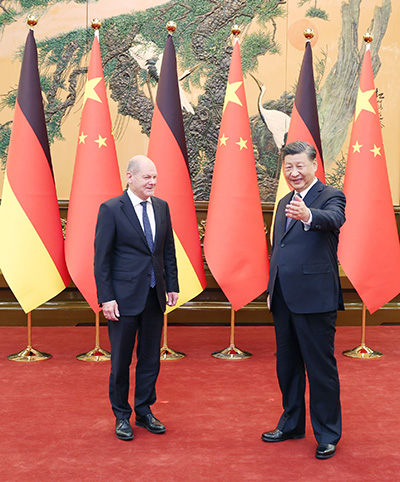
Copyright© www.gov.cn | About us | Contact us
Website identification code bm01000001 registration number: 05070218, all rights reserved. the content (including but not limited to text, photo, multimedia information, etc) published in this site belongs to www.gov.cn., without written authorization from www.gov.cn, such content shall not be republished or used in any form., copyright© www.gov.cn | contact us, website identification code bm01000001, registration number: 05070218.
German Chancellor Scholz asks China for economic ties 'as equals'
Germany's Olaf Scholz said Friday on his first visit to China as chancellor that he sought a deeper economic relationship with Beijing but expected equal treatment.
Issued on: 04/11/2022 - 01:26
"What is clear for us is that we do not believe in ideas of decoupling (with China) but it is also clear that that has something to do with economic ties as equals, with reciprocity, with the issue that access to investment must be provided equally," he said in a statement at the start of talks with Chinese Premier Li Keqiang.
Scholz's visit is likely a welcome development for the Chinese leadership, who will be looking to shore up relations with the outside world after the conclusion of the 20th Party Congress, where Xi consolidated his status as the core of the ruling Communist Party.
"China, in the present domestic and international environments, requires his visit and whatever both sides would jointly declare in Beijing, especially shortly after the (Party) Congress," said Shi Yinhong, a professor of international relations at Renmin University in Beijing.
Amid historic inflation and looming recession in Germany, Scholz will be looking to emphasise the need for continued cooperation with China, analysts say.
Scholz will meet with Xi, where he is also expected to raise controversial issues such as human rights, Taiwan and the difficulties German companies face accessing the Chinese market, according to government sources.
In the run-up to the visit, there had been criticism of the visit within the EU and the German government coalition, mainly from the Green Party and the Liberals.
These tensions were brought to the fore by a deal whereby Chinese shipping giant Cosco received the green light from Berlin to obtain a stake in a Hamburg port terminal despite opposition from coalition partners.
Despite political rows within Germany over the Cosco bid, China’s crucial role in key industries from shipbuilding to electric vehicles, along with the unprecedented economic headwinds facing Germany, meant Scholz needs cooperation with China more than his predecessor Angela Merkel ever did, said Wang Yiwei, Jean Monnet Chair Professor and director of the Centre for European studies at Renmin University.
"Merkel was also quite ideological (towards China) in the beginning but then she changed her tune. Scholz has changed his tune even faster, but he does not have as solid of a domestic political standing as Merkel," said Wang.
(FRANCE 24 with REUTERS)
Daily newsletter Receive essential international news every morning
Take international news everywhere with you! Download the France 24 app
The content you requested does not exist or is not available anymore.
Scholz will use trip to press Beijing on opening markets and human rights
- Medium Text

Sign up here.
Reporting by Beijing newsroom, with Matthias Williams and Andreas Rinke; Writing by Rachel More and Matthias Williams; Editing by Alex Richardson and David Holmes
Our Standards: The Thomson Reuters Trust Principles. New Tab , opens new tab
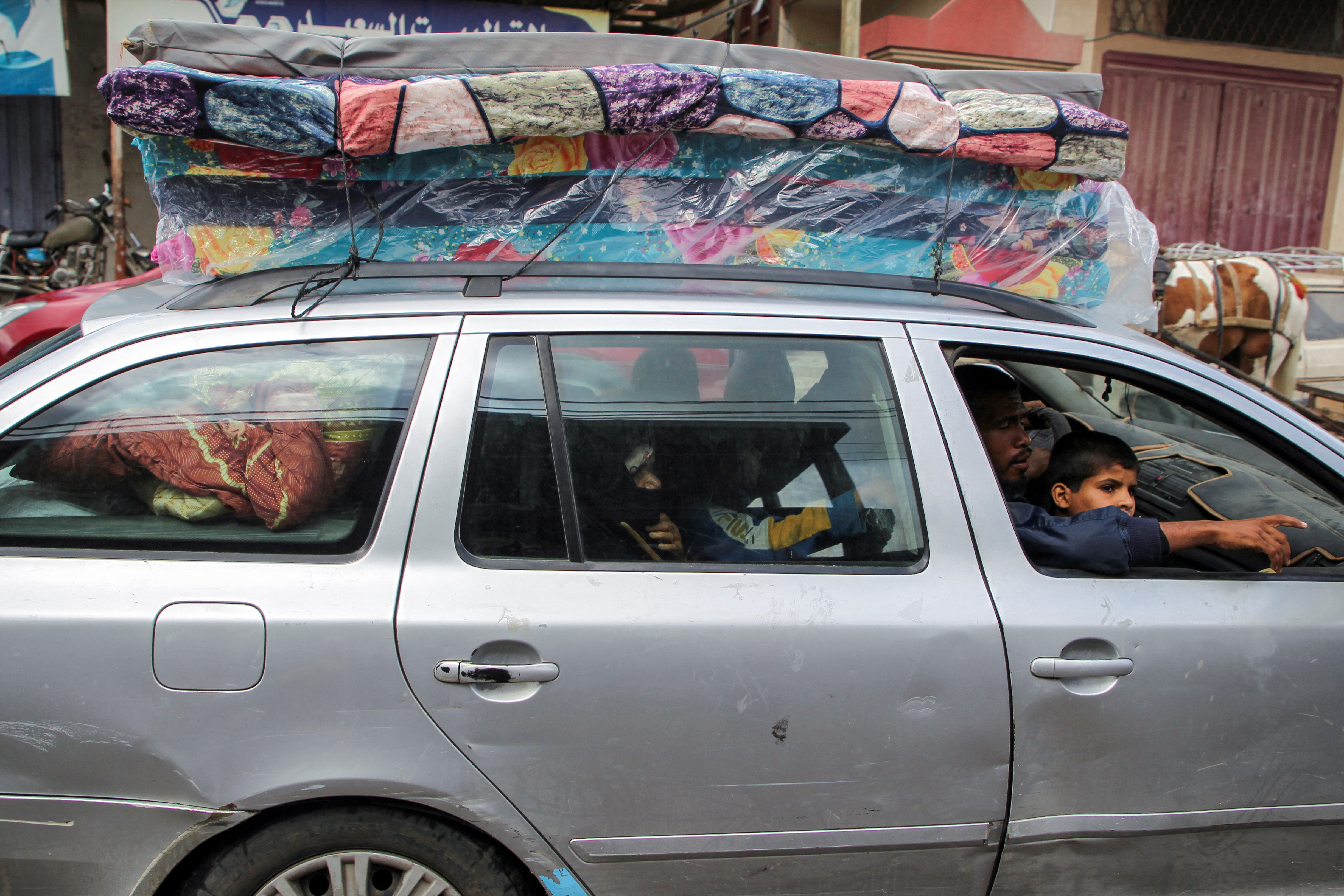
World Chevron
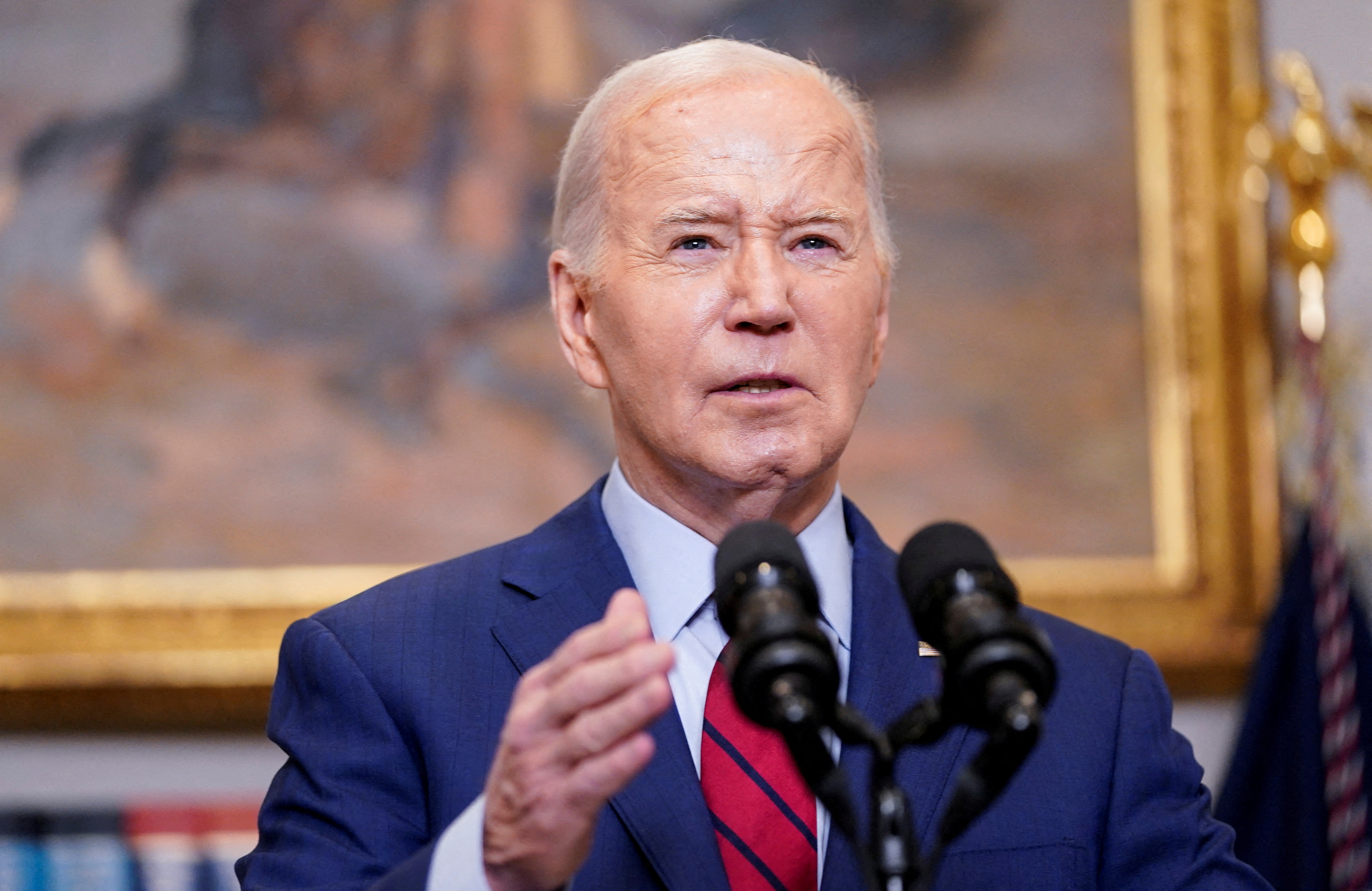
Biden meets Jordan's King Abdullah as Gaza ceasefire hopes dim
President Joe Biden will meet Middle East ally, Jordan's King Abdullah II, at the White House on Monday with prospects for a Gaza ceasefire appearing slim and Palestinian Islamist group Hamas and Israeli officials blaming each other for the impasse.
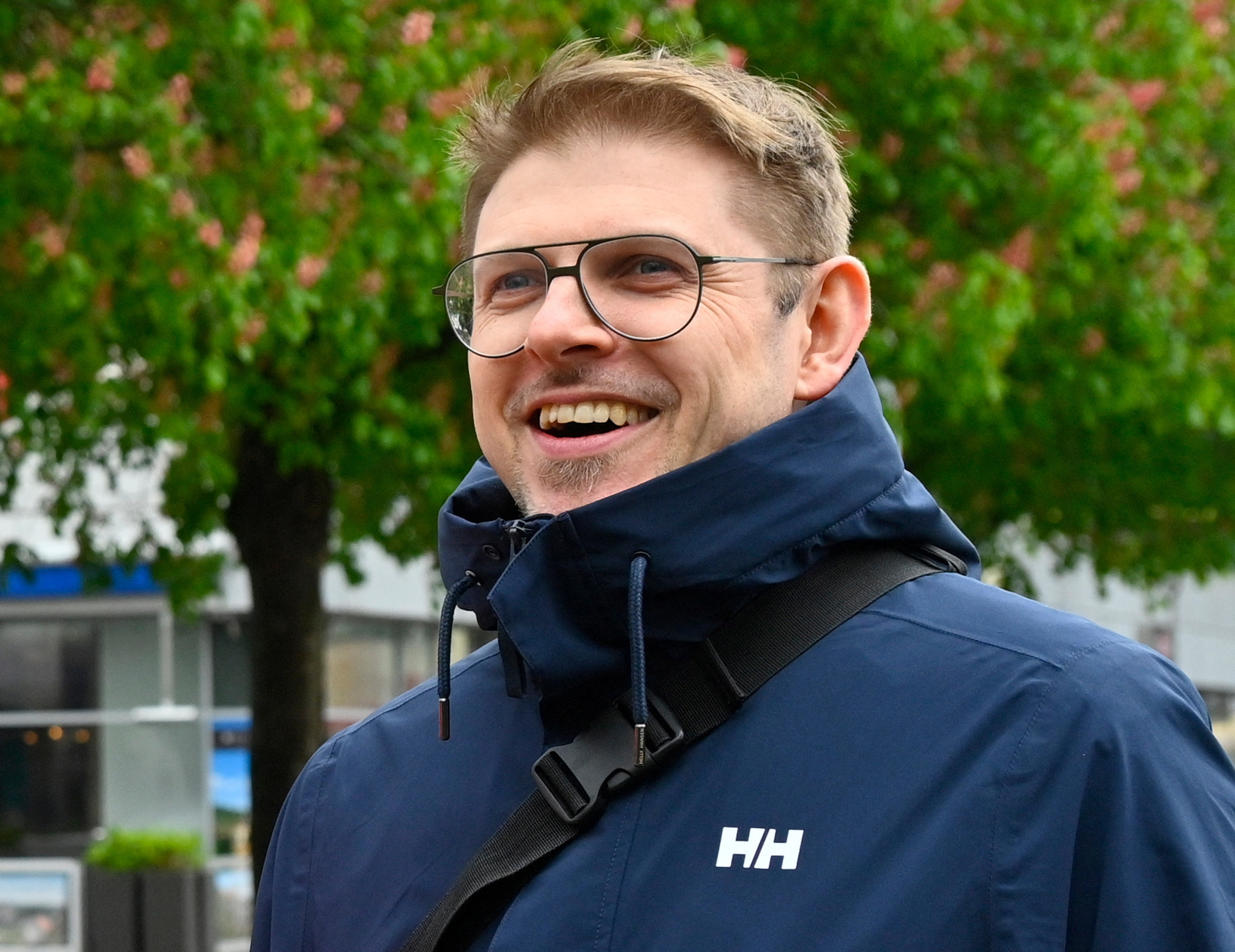
German Chancellor Scholz to visit China for talks with President Xi
The German government says Chancellor Olaf Scholz will visit China for talks with Chinese President Xi and other senior officials.
A government spokesperson told reporters on Monday that the chancellor will leave for the three-day visit on Saturday.
He is expected to hold talks with Xi Jinping in the capital, Beijing, next Tuesday. He will also visit the cities of Chongqing and Shanghai.
It will be Scholz's second visit to China and the first since November 2022. He will be accompanied by three ministers.
The spokesperson said major items on the agenda will include responses to Russia's invasion of Ukraine and the situation in the South China Sea.
China is Germany's largest trading partner. But Berlin intends to reduce its dependence on the country based on lessons learned from its reliance on Russian natural gas and other energy resources.
The visit comes as China is opposing an investigation by the European Union into electric vehicles imports from the country. Beijing is concerned that the probe could lead to additional tariffs on Chinese EVs.
The German spokesperson said Scholz is generally skeptical about the protective tariffs.
German businesses, mainly large companies, still see Germany-China relations as important.

This copy is for your personal, non-commercial use only. To order presentation-ready copies for distribution to your colleagues, clients or customers visit http://www.djreprints.com.
https://www.barrons.com/news/germany-s-scholz-to-travel-to-china-on-saturday-spokesman-d58a78db
- FROM AFP NEWS
Germany's Scholz To Meet Xi During 3-day China Trip
- Order Reprints
- Print Article
ADDS trip details
German Chancellor Olaf Scholz will travel to China on Saturday for a three-day visit that will include talks with Chinese leader Xi Jinping, at a time when both economic giants are struggling.
Scholz will meet Xi and Chinese Premier Li Qiang in Beijing at the end of his trip on April 16, the chancellor's spokesman Steffen Hebestreit said at a press conference on Monday.
He will also travel to the central city of Chongqing on Sunday, before heading to Shanghai on Monday.
Along the way, Scholz will hold talks with German business executives and give a speech at a Shanghai university.
He will be accompanied by a trio of cabinet ministers and a German industrial delegation.
The visit to China is Scholz's second since he became chancellor, with the first in November 2022.
That trip took place under strict Covid pandemic restrictions, which limited the visit to one day.
The 2022 visit also took place against the backdrop of a heated debate over the need to reduce Germany's lopsided reliance on China, prompted by Russia's invasion of Ukraine and rising concern over geopolitical risks.
Scholz has insisted there will be no "decoupling" from its biggest trading partner, but Germany has also been cautiously nurturing relationships with other countries in southeast Asia.
As well as trade issues, the war in Ukraine will also be on the agenda during the talks with Xi, who has maintained closer ties with Russian President Vladimir Putin.
"I think China has influence on Russia and our wish would be for China to be able to exercise the influence it has," Hebestreit said.
Germany's Scholz To Meet Xi During 3-day China Trip
An error has occurred, please try again later.
This article has been sent to
- Cryptocurrencies
- Stock Picks
- Barron's Live
- Barron's Stock Screen
- Personal Finance
- Advisor Directory
Memberships
- Subscribe to Barron's
- Saved Articles
- Newsletters
- Video Center
Customer Service
- Customer Center
- The Wall Street Journal
- MarketWatch
- Investor's Business Daily
- Mansion Global
- Financial News London
For Business
- Corporate Subscriptions

For Education
- Investing in Education
For Advertisers
- Press & Media Inquiries
- Advertising
- Subscriber Benefits
- Manage Notifications
- Manage Alerts
About Barron's
- Live Events
Copyright ©2024 Dow Jones & Company, Inc. All Rights Reserved
This copy is for your personal, non-commercial use only. Distribution and use of this material are governed by our Subscriber Agreement and by copyright law. For non-personal use or to order multiple copies, please contact Dow Jones Reprints at 1-800-843-0008 or visit www.djreprints.com.

Will German chancellor’s visit to China change countries’ ties?
Olaf Scholz is the first Western leader to meet Xi Jinping since the Chinese president began his third term.
German Chancellor Olaf Scholz visited China , becoming the first leader of the Group of Seven (G7) nations to do so since the pandemic.
But the trip comes at a time of deep divisions between Beijing and the West.
Keep reading
Germany’s olaf scholz meets china’s xi jinping as trade in focus, ‘nuclear wars must not be fought,’ china president xi says, us confronts china, russia at un over n korean missile launches, from the party congress in china to the midterm us elections.
During the war in Ukraine, China has remained close to Russia, while Germany and the European Union have supplied weapons to Kyiv and imposed severe sanctions on Moscow.
There are other big divisions too. The West is concerned about human rights, the treatment of Uighur Muslims, and China’s intentions towards Taiwan.
But Germany and China’s trade relations are extremely important to both.
President Xi Jinping said he hoped for more cooperation between their countries during what he called “a time of change and chaos”.
And Scholz said he was not in favour of breaking from China, but wanted a relationship based on equality.
So in what direction are relations between China, Germany and the EU heading?
Presenter: Mohammed Jamjoom
Andy Mok – Senior research fellow with the Center for China and Globalisation in Beijing
Gesine Weber – Research analyst with the Paris Office of the German Marshall Fund of the US and expert in European security
Yu Jie – Senior research fellow on China at the Chatham House think-tank in London
- Election 2024
- Entertainment
- Newsletters
- Photography
- Personal Finance
- AP Investigations
- AP Buyline Personal Finance
- AP Buyline Shopping
- Press Releases
- Israel-Hamas War
- Russia-Ukraine War
- Global elections
- Asia Pacific
- Latin America
- Middle East
- Election Results
- Delegate Tracker
- AP & Elections
- Auto Racing
- 2024 Paris Olympic Games
- Movie reviews
- Book reviews
- Personal finance
- Financial Markets
- Business Highlights
- Financial wellness
- Artificial Intelligence
- Social Media
Germany’s Scholz makes difficult visit to assertive China
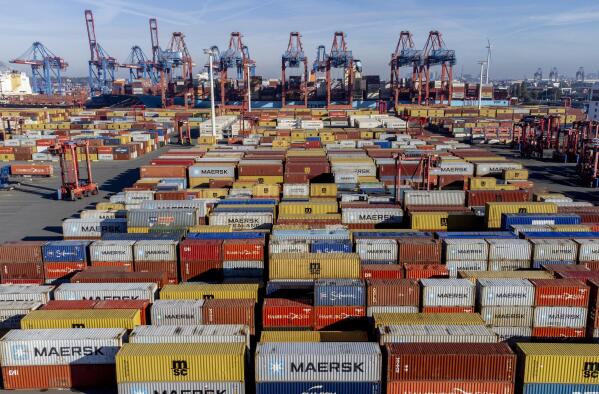
FILE -- Containers are piled up in the harbor in Hamburg, Germany, Wednesday, Oct. 26, 2022. Chancellor Olaf Scholz is making his first visit to China as German leader this week, a diplomatically delicate trip as Germany and the European Union work on their strategy toward an increasingly assertive and authoritarian Beijing. (AP Photo/Michael Probst, file)
FILE -- Containers are photographed in the harbor in Hamburg, Germany, Wednesday, Oct. 26, 2022. German Chancellor Olaf Scholz is making his first visit to China as German leader this week, a diplomatically delicate trip as Germany and the European Union work on their strategy toward an increasingly assertive and authoritarian Beijing. (AP Photo/Michael Probst, file)
FILE -- Containers coming from China are piled in the harbor in Hamburg, Germany, Wednesday, Oct. 26, 2022. German Chancellor Olaf Scholz is making his first visit to China as German leader this week, a diplomatically delicate trip as Germany and the European Union work on their strategy toward an increasingly assertive and authoritarian Beijing. (AP Photo/Michael Probst, file)
FILE -- German Chancellor Olaf Scholz attends his first annual summer news conference in Berlin, Germany, Thursday, Aug. 11, 2022. German Chancellor Olaf Scholz is making his first visit to China as German leader this week, a diplomatically delicate trip as Germany and the European Union work on their strategy toward an increasingly assertive and authoritarian Beijing. (AP Photo/Michael Sohn, file)
FILE -- German Chancellor Olaf Scholz attends a press conference at the Chancellery in Berlin, Germany, Monday, July 4, 2022. German Chancellor Olaf Scholz is making his first visit to China as German leader this week, a diplomatically delicate trip as Germany and the European Union work on their strategy toward an increasingly assertive and authoritarian Beijing. (AP Photo/Michael Sohn, file)
- Copy Link copied
BERLIN (AP) — Chancellor Olaf Scholz is making his first visit to China as German leader this week, a diplomatically delicate trip while Germany and the European Union work on their strategy toward an increasingly assertive and authoritarian Beijing .
Scholz’s messages will face close scrutiny. While his nearly year-old government has signaled a departure from predecessor Angela Merkel’s firmly trade-first approach, he is taking a business delegation and his trip follows domestic discord over a Chinese shipping company’s investment in a German container terminal .
The leader of Europe’s biggest economy will meet President Xi Jinping and Premier Li Keqiang during Friday’s one-day visit. With China still imposing tough COVID-19 restrictions, his delegation won’t stay in Beijing overnight.
Scholz’s visit, the first recently by a major EU leader, comes just after Xi was named to a third term as head of the ruling Communist Party and promoted allies who support his vision of tighter control over society and the economy. It is also accompanied by rising tensions over Taiwan and follows a U.N. report that said Chinese human rights violations against Uyghurs and other ethnic groups may amount to “crimes against humanity.”
A senior German official, who briefed reporters on condition of anonymity in line with department rules, characterized the visit as “an exploratory trip” to find out “where China stands, where China is going and what forms of cooperation are possible with this specific China in the current global situation.”
The official pointed to China’s “particular responsibility” as an ally of Russia to help end the war in Ukraine and press Moscow to tone down its nuclear rhetoric; to concerns over tensions in Taiwan and the broader region; to Germany’s desire for a “level playing field” in economic relations; and to Scholz’s current status as this year’s chair of the Group of Seven industrial powers.
Even as political relations have grown tenser, business ties have flourished. China was Germany’s biggest trading partner in 2021 for the sixth consecutive year, its biggest single source of imports and its No. 2 export destination after the U.S.
Scholz’s government has sought to balance those ties with recognition that China is increasingly a competitor and “systemic rival,” as well as a partner on issues such as climate change. His three-party coalition has pledged to draw up a “comprehensive China strategy.”
That is still pending. But Russia’s war in Ukraine is concentrating minds as Germany grapples with the fallout of having depended on Russia for over half its natural gas supplies. This year, Germany has scrambled to end that dependence, while Russia eventually shut off supplies .
Foreign Minister Annalena Baerbock said Sunday that she fears “that a mistake Germany made in recent years with Russia could be repeated.” And, she told ARD television, “we must prevent that.”
Baerbock’s comments came after the government argued over whether to allow China’s COSCO to take a 35% stake in a container terminal at the Hamburg port. Baerbock and others in two junior coalition parties opposed the deal while Scholz downplayed its significance. In a compromise, COSCO was cleared to take a stake below 25%, above which an investor can block a company’s decisions.
Scholz has appeared to tread a middle path on China. Unlike his two immediate predecessors, he made Japan rather than China his first Asian destination. He is encouraging companies to diversify, but isn’t discouraging business with China.
After an EU summit last month, he said: “No one is saying that we have to get out of there, we can’t export there any more, we can’t invest there and we can’t import from China any more.”
But, in an increasingly multipolar world, ”we shouldn’t concentrate on just a few countries,” he said, adding that “not putting all your eggs in one basket” is wise.
At the same summit, leaders of the 27-nation EU discussed reducing their dependence on China for technology equipment and raw minerals, and agreed to demand a better balance of economic relations while working with Beijing on global issues.
Scholz said in an article for the Frankfurter Allgemeine Zeitung newspaper that he’s traveling “as a European,” and Berlin consulted closely with European and trans-Atlantic partners before the visit. He said “Germany’s China policy can only be successful if embedded in a European China policy.”
Chinese Foreign Ministry spokesperson Zhao Lijian said Tuesday that Beijing believes Scholz’s visit “will inject new impetus” into the development of the “comprehensive strategic partnership” between the two countries “and contribute to world peace, stability and growth.”
“Current Sino-German relations can be characterized as ‘cold politically and hot economically,’” said Ding Chun, director of the Center for European Studies of China’s Fudan University, using a formulation often used to describe Beijing’s relations with Japan. But Ding said the visit will help promote bilateral relations by showing support for economic ties and multilateralism in the face of calls for “decoupling.”
In Germany, many are warier.
Scholz should warn China against substantial support for Russia in the Ukraine war, make clear to its leaders that Germany is committed to EU unity toward Beijing, and to German managers the extent of the geopolitical risks they might face, said Guntram Wolff, the director of the German Council on Foreign Relations think tank.
Some recent decisions “looked more as though they want to take up the Merkel tradition, in which people thought they could bring about change through trade and so on,” he said.
The head of Germany’s domestic intelligence agency, Thomas Haldenwang, recently made a comparison with the turmoil over the Ukraine war, saying that “Russia is the storm, China is climate change.”
Some human rights groups have urged Scholz to cancel the trip, but German officials argue that they won’t achieve anything if they don’t attempt dialogue.
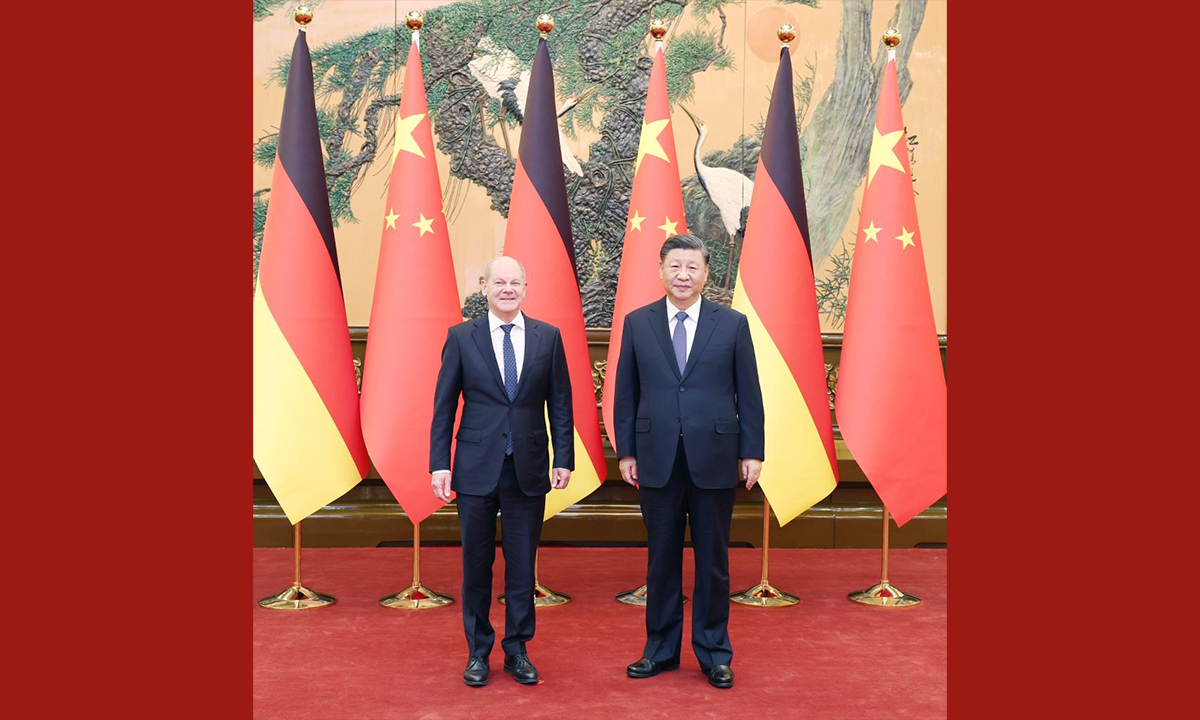
Chinese President Xi Jinping meets with German Chancellor Olaf Scholz on his official visit to China at the Great Hall of the People in Beijing, capital of China, Nov 4, 2022. Photo:Xinhua
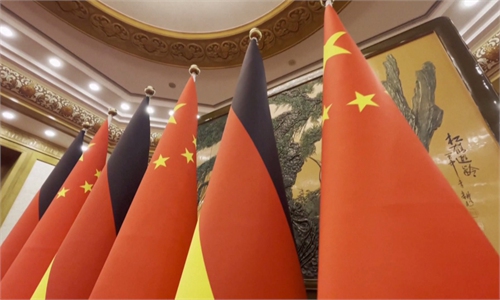
Chinese and German leaders on Friday pledged to endorse economic globalization and forge closer partnerships in a wide ...
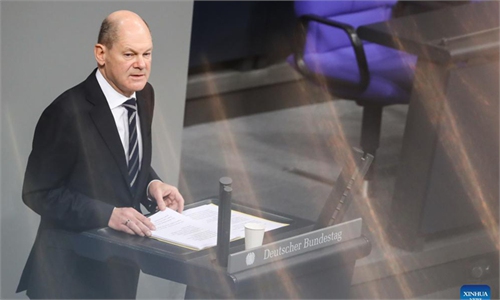
Amid pressure from the US and EU nations, German Chancellor Olaf Scholz defended his China position one day ...
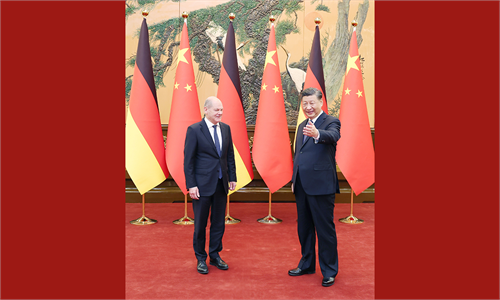
Chinese President Xi Jinping met with German Chancellor Olaf Scholz on his official visit to China in Beijing ...

Macron sets Ukraine as top priority as China's Xi Jinping pays a state visit to France
French President Emmanuel Macron is welcoming China’s Xi Jinping for a two-day state visit to France
PARIS — French President Emmanuel Macron will press China’s Xi Jinping to use his influence to move Russia toward ending the war in Ukraine during a two-day state visit to France . The leaders are also expected to discuss trade disputes over electric cars, cognac and cosmetics.
Macron’s office said talks about diplomatic efforts to support Ukraine and put pressure on Russia are a top priority for France. Discussions will also include the Middle East, trade issues and global challenges including climate change. The European Commission president will join part of the meetings to raise broader EU concerns.

Macron makes Ukraine top priority as China's Xi Jinping visits Europe
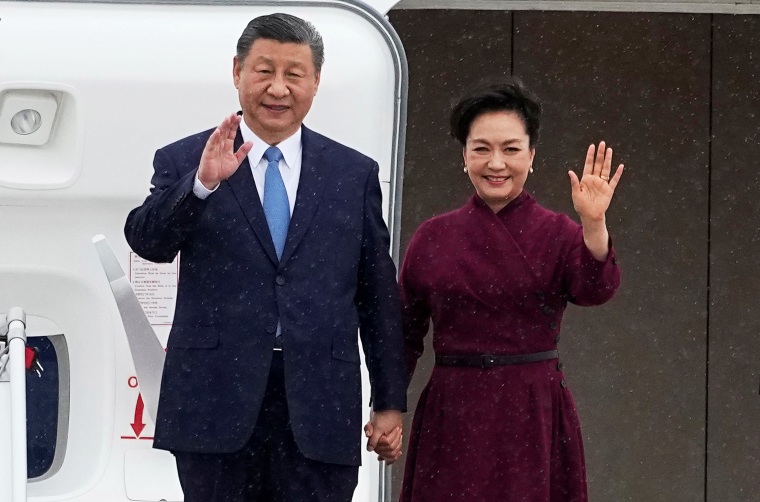
PARIS — French President Emmanuel Macron will seek to press China’s Xi Jinping to use his influence to move Russia toward ending the war in Ukraine during a two-day state visit to France. Both leaders were also expected to discuss trade disputes over electric cars, cognac, and cosmetics.
Macron’s office said talks about diplomatic efforts to support Ukraine and put pressure on Russia are a top priority for France.
Discussions will also include the Middle East, trade issues and global challenges including climate change. The European Commission president will join part of the meetings to raise broader EU concerns.
France is the first stop on a European trip by Xi aimed at rebuilding relations at a time of global tensions. After France on Monday and Tuesday, the Chinese leader will head to Serbia and Hungary.France hopes discussions will help convince China to use its leverage with Moscow to “contribute to a resolution of the conflict” in Ukraine, according to a French presidential official. Russian President Vladimir Putin recently announced plans to visit China this month.
Macron will press Xi over supplies by Chinese companies supporting the Russian war effort despite EU sanctions, he said. China claims neutrality in the Ukraine conflict.
France also wants China to maintain a dialogue with Kyiv, the official, who was not authorized to be publicly named according to presidential policy, added.
Last year, Macron had appealed to Xi to “bring Russia to its senses” — but the call was not followed by any apparent change in Beijing’s stance.
“French authorities are pursuing two objectives that are ultimately contradictory,” Marc Julienne, director of the Center for Asian Studies at the French Institute of International Relations, wrote in a briefing note. “On the one hand, to convince Xi that it’s in his interest to help Europeans to put pressure on Vladimir Putin to end the war and, on the other hand, to dissuade the Chinese president from delivering arms to his Russian friend.
“In short, we think that Xi can help us, but at the same time we fear that he could help Putin,” Julienne wrote.
As France prepares to host the Summer Olympics, Macron said he would ask Xi to use his influence to make the Games “a diplomatic moment of peace” and respect the Olympic Truce.
Macron, a strong advocate of Europe’s economic sovereignty, is expected to focus on trade too. He will raise French concerns about a Chinese antidumping investigation into cognac and other European brandy, and tensions over French cosmetics and other sectors.
In a recent speech, he denounced trade practices of both China and the U.S. as shoring up protections and subsidies.
He has coordinated with German Chancellor Olaf Scholz, who recently visited China and came to Paris last week for a private dinner with the French president.
German government spokesman Wolfgang Buechner said Friday that Scholz in China had “clearly said that the question of over-capacity and competition though subsidies needs to be addressed.”
The EU launched an investigation last fall into Chinese subsidies and could impose tariffs on electric vehicles exported from China.
The discussions will also be closely watched from Washington, just one month before President Joe Biden is expected to pay his own state visit to France.
Xi’s visit to Paris marks the 60th anniversary of France-China diplomatic relations, and follows Macron’s trip to China in April 2023. Macron prompted controversy on that trip after he said France wouldn’t blindly follow the U.S. in getting involved in crises that are not of its concern, an apparent reference to China’s demands for unification with Taiwan.
Several groups including International Campaign for Tibet and France’s Human Rights League urged Macron to put human rights issues at the heart of his talks with Xi. Protesters demonstrated in Paris as Xi arrived Sunday, calling for a free Tibet.
Amnesty International called on Macron to demand the release of Uyghur economics professor Ilham Tohti, who was jailed for life in 2014 on charges of promoting separatism, and other imprisoned activists.
Macron said in an interview published Sunday that he will raise human rights concerns.
On Monday in Paris, Xi will first join a meeting with Macron and European Commission President Ursula von der Leyen.
A formal ceremony will then take place at the Invalides monument, before bilateral talks at the Elysee presidential palace. Macron and Xi will conclude a nearby French-Chinese economic forum and then join their wives for a state dinner.
The second day of the visit is meant to be a more personal moment.
Macron has invited Xi to visit Tuesday the Tourmalet Pass in the Pyrenees mountains, where the French leader spent time as a child to see his grandmother. The trip is meant to be a reciprocal gesture after Xi took Macron last year to the residence of the governor of Guangdong province, where his father once lived.
The Associated Press
- International edition
- Australia edition
- Europe edition
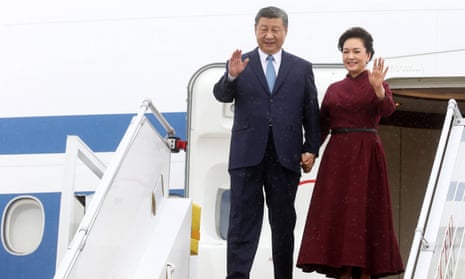
Xi Jinping arrives in France with Ukraine and EU trade row at top of agenda
On his first visit to Europe since 2019, Xi is set to meet with Emmanuel Macron before heading to Serbia and Hungary
Xi Jinping has lauded China’s ties with France as a model for the international community as he arrived in Paris amid threats of a trade war over Chinese electric cars and French cognac.
On his first visit to the EU in five years, China’s president will meet his French counterpart, Emmanuel Macron, and the European Commission president, Ursula von der Leyen , who will urge him to reduce trade imbalances and use his influence with Russia over the war in Ukraine.
Ahead of the visit, Macron told the French newspaper La Tribune that an update of relations was necessary “because China now has excess capacity in many areas and exports massively to Europe”.
In September 2023 the EU launched an investigation into whether to impose punitive tariffs to protect EU producers against cheaper Chinese electric vehicle (EV) imports that it says are benefiting from state subsidies.
On Sunday night, Von der Leyen signalled the EU’s continued discontent with China , which she said was “currently manufacturing with massive subsidies”. An oversupply of cars and steel due to weak demand at home was leading to unfair trade and unacceptable market distorting practices, said Von der Leyen, that “could lead to deindustrialiasion in Europe” and loss of jobs, particularly in the German car industry.
Macron will try to talk Xi out of retaliating over the EV investigation, potentially with import duties on French cognac and agricultural goods.
The EU is also expected to raise suspicions that sanctions on exports to Russia are being circumvented by Chinese companies trading with its neighbour. They believe multinationals based in Asia are selling legitimately into Hong Kong and mainland China but the destination of the goods is Russia.
Xi, who was welcomed in Paris by the French prime minister, Gabriel Attal, said in a statement released on his arrival that ties between China and France were “a model for the international community of peaceful coexistence and win-win cooperation between countries with different social systems”.
In a separate op-ed published in the French daily Le Figaro, the Chinese president said he was coming to France with three messages: that Beijing was committed to opening up “new vistas” in its relationship with France, opening up “ever wider” to the world, and to upholding world peace and stability.
“While opening up itself, China also encourages Chinese companies to go global,” Xi wrote. “France is advancing reindustrialisation based on green innovation, whereas China is accelerating the development of new quality productive forces.”
On the war in Ukraine , he wrote that China “understands the repercussions of the Ukraine crisis on the people of Europe”. He emphasised that Beijing was not “a party to or a participant in it”, adding that “China has been playing a constructive role in striving for peaceful settlement of the crisis”.
Xi’s six-day visit to Europe is the first since 2019 and will also see him visit Serbia and Hungary . The latter is hoping to become the European hub of Chinese electric vehicle manufacturing after BYD in 2023 sealed a deal for its first EV factory in Europe.
One of Macron’s key priorities will be to warn Xi of the danger of backing Russia in its invasion of Ukraine , with western officials concerned Moscow is already using Chinese machine tools in arms production.
The west wants China above all not to supply weapons to Russia and risk tipping the balance in the conflict.
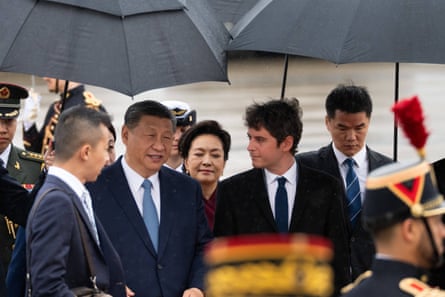
“It is in our interest to get China to weigh in on the stability of the international order,” said Macron in an interview with the Economist published on Thursday.
“We must, therefore, work with China to build peace.”
China opened an anti-dumping investigation into brandy imported from the European Union in January, sparking fears cognac could suffer a similar blow to that taken by Australian wine when China introduced tariffs of more than 200%.
“We want to obtain reciprocity of exchanges and have the elements of our economic security taken into account,” Macron told La Tribune.
Von der Leyen said on Monday: “We have to act to make sure that competition is fair and not distorted. I have made clear that the current imbalances in market access are not sustainable and need to be addressed”.
The European Commission, the European Union’s authority on trade issues, has opened more than 20 competition probes targeting China in recent months including into the supply of cars, wind turbines and medical devices.
Beijing has reacted furiously to the most recent investigation, into suspected inequitable access to China’s medical devices market, calling it a sign of EU “protectionism”.
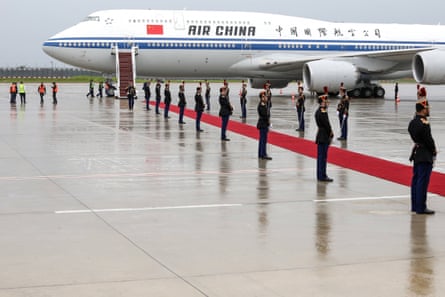
The EU’s 27 members – in particular France and Germany – are divided on their attitude towards China.
The German chancellor, Olaf Scholz, will not join Macron and Xi in Paris due to prior commitments, according to sources.
“In Europe, we are not unanimous on the subject because certain players still see China as essentially a market of opportunities,” Macron said, without naming any countries.
France will also seek to make progress on opening the Chinese market to its agricultural exports and resolve issues around the French cosmetic industry’s concerns about intellectual property rights, officials have said.
China may announce an order for about 50 Airbus aircraft during Xi’s visit, but it remains uncertain whether it will be a new deal, people familiar with the negotiations have said.
On Tuesday, Macron will take Xi to the Pyrenees, a mountainous region dear to the French president as the birthplace of his maternal grandmother, before Xi heads to Serbia and Hungary .
Reuters and Agence France-Presse contributed to this report
- Ursula von der Leyen
- Emmanuel Macron
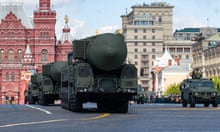
Live Russia-Ukraine war live: Putin orders nuclear weapons drills
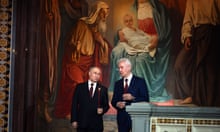
Shadow of war hangs over Orthodox Easter as Zelenskiy and Putin mark holiday
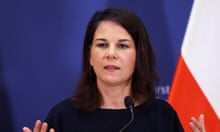
Germany summons Russian envoy over 2023 cyber-attacks

Eurovision winner Jamala says Ukraine ‘cannot afford’ to boycott contest
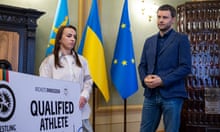
Ukrainian athletes told to avoid Russians at Olympics in Paris
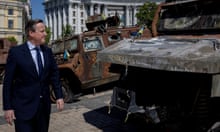
David Cameron commits £3bn a year in aid to Ukraine ‘for as long as necessary’

Night Train to Odesa by Jen Stout review – from Ukraine with love

The fight for full press freedom in Ukraine: ‘We can write what we want, but bad actors try to intimidate us’
Most viewed.
More From Forbes
Xi jinping goes to paris - what does it mean for trade and america.
- Share to Facebook
- Share to Twitter
- Share to Linkedin
PARIS, FRANCE - FEBRUARY 26: French President Emmanuel Macron welcomes German Chancellor Olaf Scholz ... [+] as he arrives to attend a conference in support of Ukraine with European leaders and government representatives on February 26, 2024 in Paris, France. February 24 marked two years since Russia's large-scale invasion of Ukraine, an event which galvanized Western Europe on the matter of its collective security. (Photo by Chesnot/Getty Images)
The last time that Xi Jinping visited France (2019) Emmanuel Macron presented him with a 1688 copy of ‘An Introduction of The Analects of Confucius’. Xi is back in Paris this weekend, his fourth visit, placing France alongside Kazakhstan and South Africa as Xi’s favourite destinations after the US (five visits) and Russia (nine).
As such, the question on my mind is what book Macron should give him this time?
He might start with something on Germany, notably Fritz Stern’s ‘Gold and Iron’ to remind us of what a strong chancellor sounds like (Bismark coined the notion of ‘blood and iron’) and indeed to highlight the link between capital and diplomacy. This is relevant because the first dilemma for Macron is how to steer Olaf Scholz toward a tougher political view on China, given that the German economy remains heavily dependent on China. Macron and Scholz had dinner together (spouses included) in Paris on Thursday.
We don’t know what was discussed – the installation of Mario Draghi as a replacement for Ursula von der Leyen, and Germany paying France to broaden its nuclear deterrent to an EU level – are two possibilities. China’s stance towards Ukraine, its deepening alliance with Russia and the ‘dumping’ of Chinese electric vehicles are topics that were most certainly broached. The mystery is Scholz’ insistence on continuing with a visit to the Baltic states on Monday (6 th May) when he could have accompanied von der Leyen and Macron to greet Xi. It might be that Germany just wants to keep its ‘special’ relationship with China to itself.
Macron might reflect that at least by having von der Leyen there, the case will be made to Xi that visiting Hungary and Serbia, two ‘bad’ actors, at the same time as France is very bad diplomacy by China. It shows that either China is very far away from a cultivated form of soft power, or that it is now so committed to its relationship with Russia that it cares less about what Europe thinks of it.
At the same time, China has lost Italy as a member of the Belt and Road group, and most of the Baltic and Eastern European states regard it with deep suspicion. Macron should dig out a copy of ‘White Eagles over Serbia’ by Lawrence Durrell to make the point that any influence operations out of Serbia will be contested.
Your Best Look Yet At The New iPhone 16
Arrowhead tells helldivers 2 players to change reviews to negative over psn linking, imessage s lock on america is this really the beginning of the end.
If he is feeling imperial (often), Macron might offer Xi a copy of Claude Martin’s ‘La Diplomatie n’est pas un dîner de gala - mémoires d’un ambassadeur’, all 946 pages of which are a reminder of the grandeur of French diplomacy, China’s humble origins and of course how far it has come, spurring demand for French handbags. I should say that, nice caricature as it is, handbags don’t make it into the top ten of French exports to China.
In that respect the substance of the Xi visit will likely be about the ways in which Europe will derisk but not decouple its trade relationship with China. At this point, I suspect that from the point of view of sensitive technologies, much of the de-risking has happened, and that EU-China trade relations are bottoming out (I expect little warmth at the diplomatic level). Both regions will for the time being regard each other as a ‘hedge’ should Donald Trump be re-elected in November and restart a series of trade disputes. Europe does not see China as a close or natural ally, but it may also be useful to preserve civil relations with it lest American politics takes a wrong turn.
To return to the question I mentioned at the top of the note, perhaps the book should be on economics, specifically asset price bubbles and speculation, an original 1841 version of Charles MacKay’s Popular Delusions and the Madness of Crowds’. An even better idea might be some of the original pamphlets (I know where to find them) relating to the scheme of John Law, the Scotsman who blew up the French economy in 1720. It is a tale of financial engineering that few countries have surpassed, with perhaps, the exception of China.

- Editorial Standards
- Reprints & Permissions

IMAGES
COMMENTS
April 16, 2024. 阅读简体中文版 閱讀繁體中文版. Chancellor Olaf Scholz of Germany tried to strike a delicate balance on a trip to China this week, promoting business ties with his ...
German Chancellor Olaf Scholz will arrive in China on Friday with a team of corporate leaders and a clear signal: it wants to keep doing business with the world's second largest economy.
Sunday, April 14, 9:39. German Chancellor Olaf Scholz is on his second visit to China since taking office. He is expected to discuss Russia's invasion of Ukraine during his summit with President ...
The German leader's visit has underscored trade-related tensions as the European Union and the United States complain that China is competing unfairly through the use of subsidies that have created massive production capacity, particularly for solar panels, electric cars and other green-energy products.. The EU is mulling tariffs to protect its producers against cheaper Chinese electrical ...
Updated 1:24 PM PDT, April 14, 2024. BEIJING (AP) — German Chancellor Olaf Scholz arrived in China on Sunday on a visit focused on the increasingly tense economic relationship between the sides and differences over Russia's invasion of Ukraine. Scholz's first destination was the industrial hub of Chongqing, where he and his delegation of ...
4 Nov 2022. German Chancellor Olaf Scholz has met with Chinese President Xi Jinping during the first visit by a leader of the Group of Seven (G7) nations to China in three years. Leading a high ...
The one-day visit took place under strict COVID-19 control measures. Federal Chancellor Olaf Scholz and General Secretary of the Chinese Communist Party, Xi Jinping. It was good to be able to meet face to face in these difficult times, said the Federal Chancellor at the start of the visit.
German Chancellor Olaf Scholz is at the tail end of his trip to China on Tuesday, meeting Chinese leader Xi and Premier Li Qiang in Beijing. The whistle-stop tour has seen him visit the ...
Germany's Chancellor Olaf Scholz arrived in China on Friday, making him the first leader of a G-7 state to travel to China since the COVID-19 pandemic began. It was a whirlwind visit: Lasting ...
Scholz is the first representative of a liberal democracy to be granted a state visit to China since ... on the German economy, and that the chancellor's focus for now has to be on keeping the ...
BEIJING — Chinese President Xi Jinping met with German Chancellor Olaf Scholz on his official visit to China at the Great Hall of the People in Beijing on Nov 4. Xi noted that Scholz is the first European leader to visit China after the 20th National Congress of the Communist Party of China, and that it is his first visit to China as the ...
German Chancellor Olaf Scholz began his one-day visit to China on Friday with a welcome from President Xi Jinping at Beijing's Great Hall of the People. Nov. 4, 2022. Get more news on.
Germany's Olaf Scholz said Friday on his first visit to China as chancellor that he sought a deeper economic relationship with Beijing but expected equal treatment. Issued on: 04/11/2022 - 01:26 ...
German Chancellor Olaf Scholz will press China to open up its markets and will raise human rights concerns next week in what will be the first visit by a European Union leader to China since the ...
Monday, April 8, 20:30. The German government says Chancellor Olaf Scholz will visit China for talks with Chinese President Xi and other senior officials. A government spokesperson told reporters ...
BERLIN — German Chancellor Olaf Scholz is planning to travel to China on November 3-4, making him the first G7 leader to visit the People's Republic since the start of the coronavirus pandemic, two officials with knowledge of the travel plans told POLITICO. Scholz's trip comes as the chancellor is walking a thin line between continuing his ...
04/14/2024 06:35 AM EDT. BEIJING — German Chancellor Olaf Scholz arrived in China on Sunday on a visit focused on the increasingly tense economic relationship between the sides and differences ...
German Chancellor Olaf Scholz will travel to China on Saturday for a three-day visit that will include talks with Chinese leader Xi Jinping, at a time when both economic giants are struggling.
German Chancellor Olaf Scholz visited China, becoming the first leader of the Group of Seven (G7) nations to do so since the pandemic.. But the trip comes at a time of deep divisions between ...
FILE -- Containers coming from China are piled in the harbor in Hamburg, Germany, Wednesday, Oct. 26, 2022. German Chancellor Olaf Scholz is making his first visit to China as German leader this week, a diplomatically delicate trip as Germany and the European Union work on their strategy toward an increasingly assertive and authoritarian Beijing.
German Chancellor Olaf Scholz's three-day visit to China, hailed in Beijing as a success, may have laid bare European Union divisions over how to engage with China.
Olaf Scholz's visit to China represents a break with the Coalition Agreement and a return to a commercial foreign policy approach. German Chancellor Olaf Scholz speaks to the media at the NATO ...
German Chancellor Olaf Scholz arrived in Beijing on Friday for an official visit to China. In the morning, Chinese President Xi Jinping met him at the Great Hall of the People and held a banquet ...
Xi used similar rhetoric in a meeting in Beijing with German Chancellor Olaf Scholz last month, in which critics accused the German leader of being too soft on China. ... to visit China this month ...
BERLIN — German Chancellor Olaf Scholz will meet French President Emmanuel Macron on Thursday night in Paris for a dinner to discuss European Union and China policy. ... which comes just days ahead of a visit by Chinese President Xi Jinping to Europe, is being described as a semi-private event: Scholz and his wife, Britta Ernst, are on a ...
BERLIN — German Chancellor Olaf Scholz arrived at an unexpected juncture this week. The 65-year-old chancellor, ... Coming just a few days before his visit to China, the controversial social network's home base, Scholz appeared desperate to convince Beijing that a friend was en route. Advertisement. Advertisement.
He has coordinated with German Chancellor Olaf Scholz, who recently visited China and came to Paris last week for a private dinner with the French president. Advertisement
French President Emmanuel Macron seeks to press China's Xi Jinping to move Russia toward ending the war in Ukraine during a two-day visit to France. ... He has coordinated with German Chancellor ...
The EU's 27 members - in particular France and Germany - are divided on their attitude towards China. The German chancellor, Olaf Scholz, will not join Macron and Xi in Paris due to prior ...
He might start with something on Germany, notably Fritz Stern's 'Gold and Iron' to remind us of what a strong chancellor sounds like (Bismark coined the notion of 'blood and iron') and ...